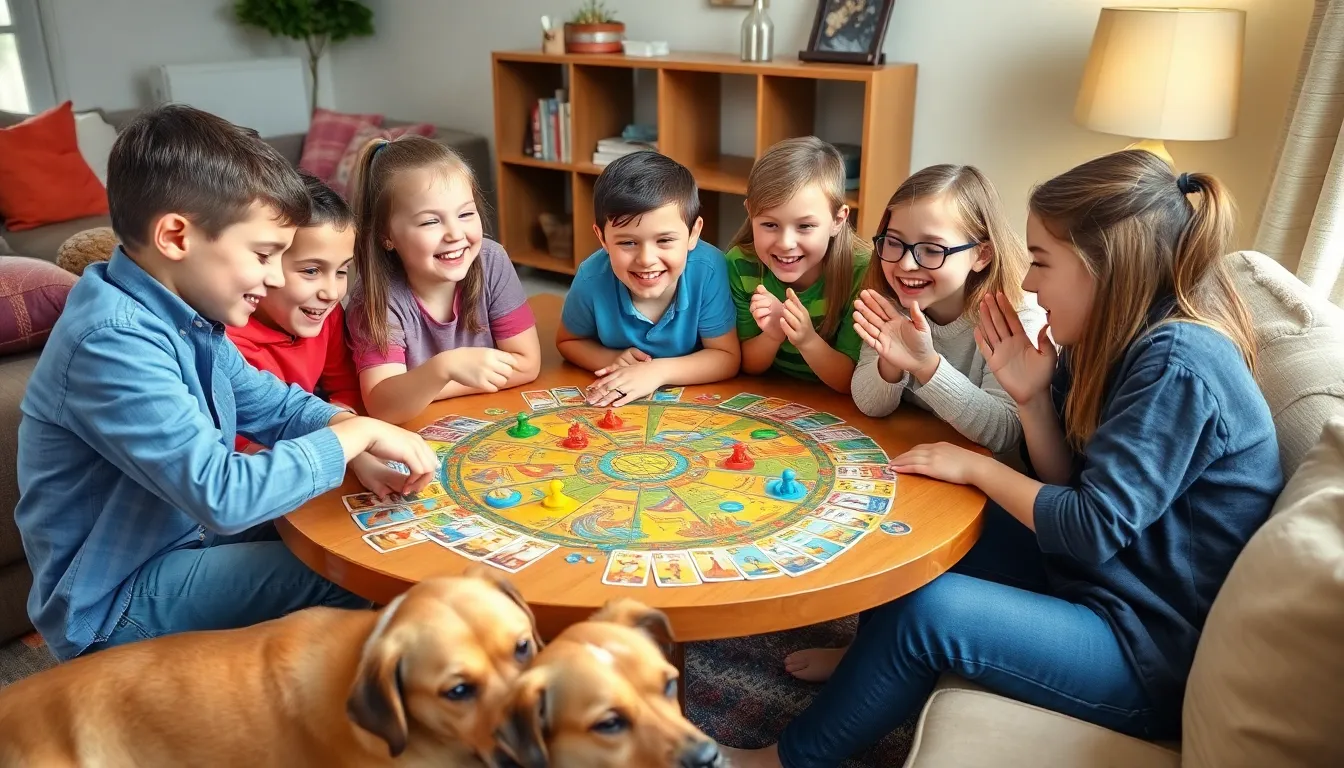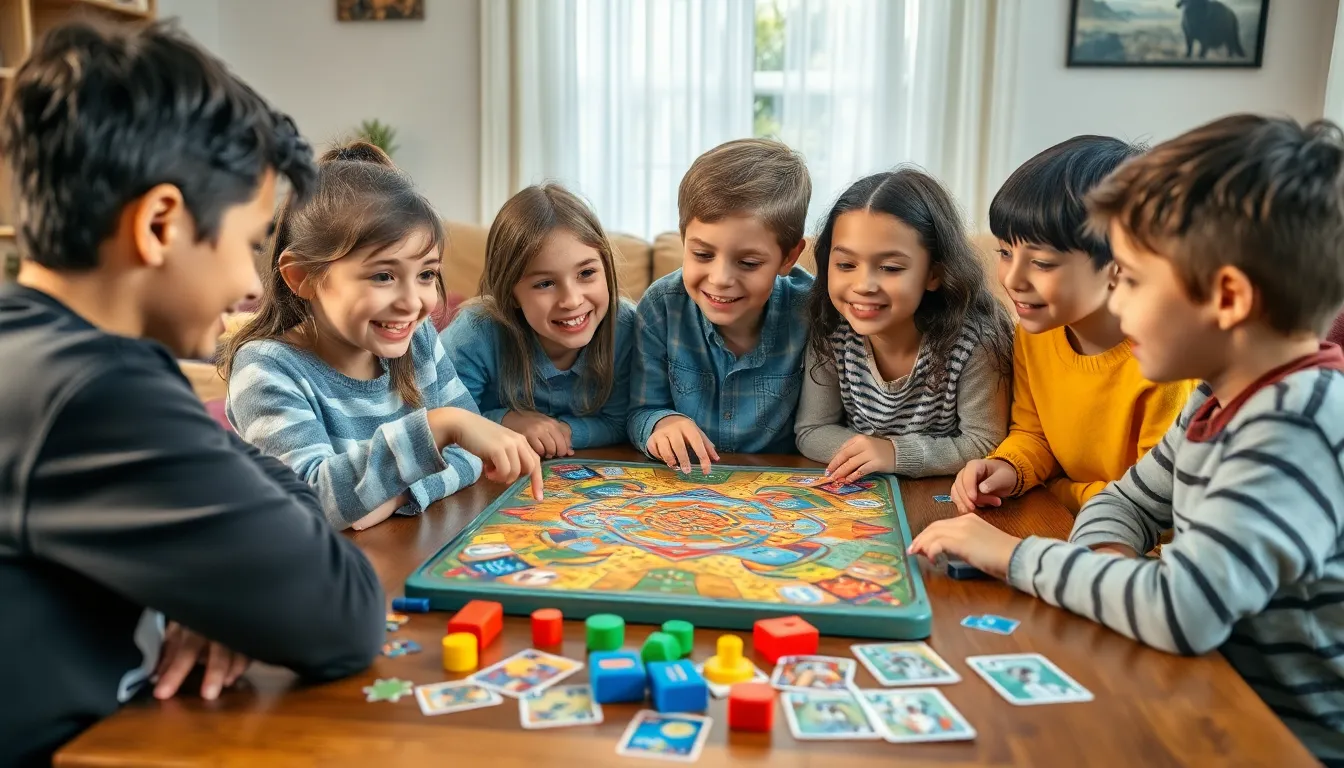Tabletop games for kids aren’t just a way to pass the time; they’re a gateway to adventure, creativity, and a sprinkle of friendly competition. Imagine a world where your child can slay dragons, build empires, or even save the galaxy—all from the comfort of your living room. These games offer more than just fun; they promote critical thinking, teamwork, and social skills, all while keeping those pesky screens at bay.
As kids roll dice and strategize over game boards, they’re not just playing; they’re learning valuable life lessons. Who knew that a game night could turn into a mini boot camp for future leaders? So grab some snacks, gather the family, and dive into the exciting realm of tabletop games that’ll have everyone laughing, bonding, and maybe even plotting a little mischief along the way.
Table of Contents
ToggleOverview of Tabletop Games for Kids
Tabletop games for kids encompass a wide range of options including board games, card games, and role-playing games. These games cater to various age groups and interests, ensuring that every child finds something enjoyable. They typically encourage players to engage in strategic thinking, problem-solving, and cooperation.
In many cases, tabletop games foster social interactions, enabling children to develop communication skills and learn the value of teamwork. Games like “Ticket to Ride” and “Catan Junior” not only entertain but also teach concepts such as resource management and planning.
Additionally, tabletop games often emphasize creativity. Games encouraging storytelling or imaginative play, such as “Dungeons & Dragons,” allow children to explore new worlds and develop their narrative skills. These experiences contribute to cognitive development and inspire innovative thinking.
Parents frequently notice the benefits of game nights spent with family or friends. Engaging in these activities strengthens bonds while instilling values such as patience, respect, and sportsmanship. Tabletop games provide a rich setting for learning life lessons in a fun and interactive way.
Variety remains a key aspect of tabletop games for kids. From educational games like “Scrabble” that promote vocabulary skills to action-packed games like “Uno” that enhance quick decision-making, there’s something for everyone. This diversity keeps children engaged and eager to learn while enjoying their time together.
Benefits of Tabletop Games
Tabletop games offer numerous benefits for kids, creating enjoyable experiences that foster valuable skills. Engaging in these activities contributes to cognitive, social, and emotional growth.
Cognitive Development
Tabletop games stimulate cognitive development through strategic thinking and problem-solving. Players must analyze situations, make decisions, and anticipate opponents’ moves, which enhances critical thinking abilities. Games like “Catan Junior” and “Ticket to Ride” encourage planning and resource management, refining these skills in a fun context. Kids learn to assess risks and balance choices while navigating their game objectives. This interactive learning environment strengthens memory and concentration, as players retain rules and strategies for success. Fun and educational, these games support development while providing an exciting outlet for creativity and imagination.
Social Skills Enhancement
Social skills enhancement occurs naturally through tabletop gaming. Players engage in teamwork, communication, and negotiation as they collaborate or compete with others. Tabletop games provide a platform for kids to form friendships and practice empathy in various situations. Engaging in shared narratives, such as the ones found in “Dungeons & Dragons,” allows children to express themselves while building narratives together. They learn valuable lessons about respect, patience, and sportsmanship, essential traits for effective collaboration. Game nights foster an inclusive atmosphere where everyone can contribute and participate, further strengthening social connections among peers.
Popular Tabletop Games for Kids
Tabletop games for kids come in various types, providing fun and educational experiences. These games can cater to different age groups, ensuring young players gain valuable skills while enjoying playtime.
Age-Appropriate Recommendations
For ages 4 to 7, games like “Candy Land” and “Chutes and Ladders” help develop basic counting and color recognition skills. Children aged 8 to 12 benefit from “Catan Junior” and “Qwirkle,” which introduce strategic thinking and teamwork. “Labyrinth” offers adventure while teaching planning skills, perfect for this age group. Teens can engage with “Dungeons & Dragons,” encouraging creativity and storytelling in a collaborative setting. Each game fosters age-appropriate skills and social interaction, essential for growth.
Game Genres to Explore
Exploring various genres enhances the tabletop gaming experience. Board games such as “Ticket to Ride” and “Carcassonne” focus on strategy and resource management. Card games, including “Uno” and “Exploding Kittens,” provide quick gameplay and encourage social interaction. Cooperative games like “Forbidden Island” teach teamwork, as players work together to achieve a common goal. Lastly, role-playing games foster imagination, allowing children to craft unique narratives while developing critical thinking. Each genre offers specialized benefits that contribute to a child’s overall development.
Tips for Choosing the Right Game
Choosing the right tabletop game for kids involves evaluating several key factors. Understanding age appropriateness and skill level ensures better engagement and enjoyment.
Considerations for Age and Skill Level
Consider the age of the child before selecting a game. Different games target specific age ranges to match developmental abilities. For example, games like “Candy Land” suit younger players, while “Catan Junior” fits older children. Skill level remains equally important; beginners benefit from simple rules while experienced players may enjoy more challenging gameplay. Assessing these factors contributes significantly to player enjoyment and reduces frustration.
Family Preferences and Playstyle
Evaluate family preferences and playstyle when choosing a game. Some families enjoy competitive games, while others might prefer cooperative ones. Games like “Forbidden Island” encourage teamwork, while “Ticket to Ride” fosters friendly rivalry. Additional factors like game duration and complexity affect family dynamics during playtime. Observing how family members interact with specific game types will guide future selections and enhance the gaming experience.
Conclusion
Tabletop games offer a unique blend of fun and education for kids. They create opportunities for children to develop essential skills while enjoying quality time with family and friends. By engaging in these games, kids not only learn strategic thinking and teamwork but also enhance their social interactions and creativity.
With a wide range of options available, parents can easily find games that suit their children’s interests and age groups. Whether it’s a cooperative adventure or a competitive challenge, tabletop games can transform family game nights into memorable experiences. Embracing these games can lead to lasting benefits that extend far beyond the gaming table.









